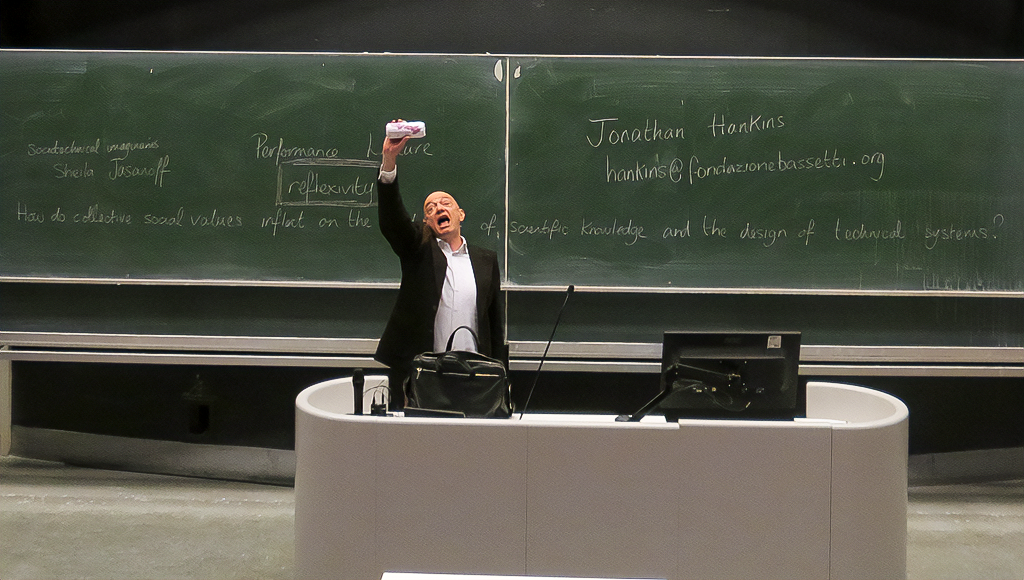On Thursday 5th and Monday 9th of December (2024), Bassetti Foundation correspondent Jonathan Hankins brought discussion about responsible innovation and sociotechnical imaginaries to Leiden University Institute of Cultural Anthropology and Development Sociology, as part of its Social Theories undergraduate course. Here his report:
In December of 2024 I was given the opportunity to discuss responsible innovation and sociotechnical imaginaries at Leiden University Institute of Cultural Anthropology and Development Sociology, as part of its Social Theories undergraduate course.
I had two lecture slots. The first opened with my Longevity: Now Available in Cans! performance lecture, followed with a workshop-style discussion that not only involved conversation and debate but also the construction of other ‘near future’ drinks on the part of the students.
The second session opened with the continuation of these discussions, followed by an overview of responsible innovation questions, frameworks and practices with a particular focus on René von Schomberg’s contribution to the field.
The Longevity: Now Available in Cans! performance lecture had initially been developed as part of a course which had a ‘society for all ages’ theme, its aim being to focus on the theme of longevity and demographic change within modern industrial society through reflexivity (read all about the article of the same title here). In an expansion of the approach, this performance aimed to address and interrogate the concept of sociotechnical imaginaries, a conceptual tool that has been developed by Sheila Jasanoff over the last decade and more (download more about it here).
Jasanoff describes sociotechnical imaginaries as being ‘collectively held, institutionally stabilized, and publicly performed visions of desirable futures, animated by shared understandings of forms of social life and social order attainable through, and supportive of, advances in science and technology’. This description formed a framework for our co-produced analysis of Longevity (a ‘near future’ fictional product), a nanotechnology drink that allows its user to control their own adrenaline production. This control allows them to manipulate their metabolism and to fall into a kind of hibernation state each night, slowing the aging process and lengthening life by 30%.
From the starting point of the question of whether ‘artifacts have politics’ posed by Langdon Winner in 1980 (download his paper here), discussion focused on whether innovative technological products embodied and reflected shared values of the society that formed them. As a provocation, many possible values were highlighted during the performance, laying bare some rather questionable but taken-for-granted assumptions about a society that could produce such products (not least a market model for the governance of innovation). Amongst a host of others, topics brought forward included thinking about science and resulting innovation as a good in itself, problems of equity and social justice, the value of novelty, the possibility of social control practiced through consumption and the implications of academic approval and the status it might afford
While leading the discussion I introduced several other topics that will be familiar to our regular readers, including the double bind problem raised by the Collingridge Dilemma of information and power within innovation processes, the history of the development of RI thinking (including an overview of the various frameworks used in the implementation and investigation of Responsible Innovation (RI) and Responsible Research and Innovation (RRI), and the role of funding bodies in the diffusion of the concept.
A section was dedicated to René von Schomberg, his vision for a Responsible Research and Innovation model that could direct or redirect research and innovation towards societally desirable ends and his understanding of the deficits of the current model, before a concluding section addressed the de-facto rri movement (spearheaded by Sally Randles and colleagues and very much reflecting many of the Bassetti Foundation’s interests and practices). In this form of RRI (sometimes also known as little rri) analysis focusses on how societal cares and concerns become embedded in practices, structures, and governance instruments which then orient organizational models towards specific normative goals.
From my own perspective, these were two very enjoyable events. The students participated fully, the transformation of a rather sterile lecture hall into a performance space full of fun, laughter and even singing being a co-production of all those present.
Several of the values that were offered for debate showed impressive critical thinking, informed (I feel) from the earlier lectures in this course as well as broader life experiences. The products that the students prepared themselves generated a lot of food for thought, and I gained a lot of insight that I will build into the development process of this methodology.
Thanks to all those who participated in making this such an inspirational event.

















